Letting Go: Two NW Sanghas Embrace Impermanence
Written by: Chikyo Ryunin Ewan Magie
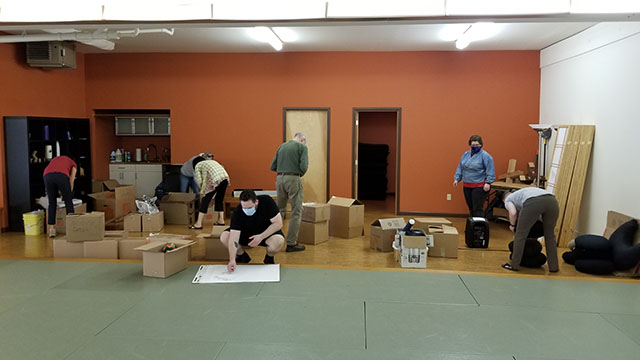
Time for change, packing up Seattle Soto Zen in Seattle.
Photos by: Marc Jaffrey, Red Cedar Zen, Steve Wilhelm
Red Cedar Zen in Bellingham, and Seattle Soto Zen in Seattle, both let go of their physical zendos during the 2020 pandemic.
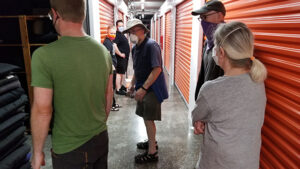
The Sangha pitches in to put Seattle Soto Zen into storage.
Both Sanghas continue to offer Soto Zen practice online every week, and will initiate searches for new zendos in 2021. Daily practice goes on in these well-established Northwest Sanghas, despite transitioning to Zoom online and despite the challenges presented by the Covid-19 pandemic.
Everyone feels the strain of quarantine, and widespread uncertainty and fear during this time. The economic turndown is straining Zen groups and families and individuals, as well as the businesses and institutions upon which they depend.
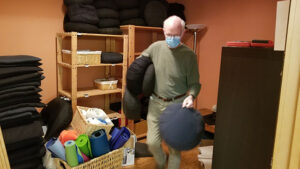
John Green says goodbye to Seattle Soto Zen in storage.
As economic strategies, both Northwest groups during 2020 let go of their longstanding leased zendos. Sometime in 2021 both groups plan to start searching for sites for new zendos.
Red Cedar Zen and Seattle Soto Zen both moved online in March 2020, immediately after restrictions on gatherings were imposed due to the pandemic. By April the Seattle group had decided to let go of its zendo on lower Queen Anne, a neighborhood along Seattle’s Lake Washington Ship Canal.
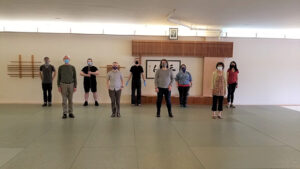
Saying goodbye to the zendo, one last group photo.
In a moving transition Resident Teacher Kanshin Allison Tait, and a number of long-time practitioners, gathered at the Seattle zendo with masks on and carried bells and cushions to a nearby storage unit.
Red Cedar Zen followed suit some months later, holding its “Closing the Hall Ceremony” in early October. Led by Guiding Teacher Nomon Tim Burnett and longtime Sangha member John Wiley, members bowed inside the empty Red Cedar Dharma Hall, and then joined in an outdoors procession around the block.
It was an emotionally moving event for many longtime practitioners, ritually letting go of the temple that has housed so much Soto Zen practice for so many years. The Dharma hall, located just blocks from Western Washington University and the Bellingham Food Co-Op, has long been a pillar of spiritual practice in the Bellingham community.
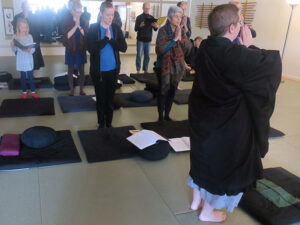
The Seattle Soto Zen Sangha meeting together, pre-pandemic.
After moving online for much of 2020, much of both zendos’ group practice will likely stay online into 2021.
Both Sanghas continued to offer a full range of practice opportunities online throughout 2020. This included daily practice at Red Cedar and Seattle Soto Zen, plus Sunday morning and Tuesday evening practice.
In June Red Cedar offer its annual Samish Island sesshin via Zoom. While it wasn’t the same as going to the beautiful Samish Island Campground Retreat Center 40 miles south of Bellingham, it was a deep and sincere practice opportunity. Those who participated were deeply grateful that through Zoom they could reconnect, see one another, and practice “together” in a unique way.

The Red Cedar Zen facility, shared with Bellingham Insight, was a significant presence in the Bellingham Dharma community.
While practicing online is not ideal, Sanga members have supported public health policies, so sitting together virtually has been vitally important for many people to sustain practice. Surprisingly, membership and participation have grown for both Sanghas during the Covid-19 pandemic.
Both Sanghas have gradually understood this growth reflected the profound hunger for spiritual practice and connection created by the global pandemic and by widespread quarantine. People always need practice, but now practice is especially important and meaningful.
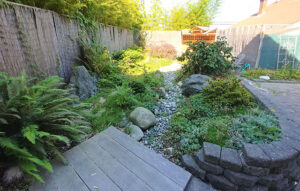
The garden behind the former Red Cedar Zen facility.
Both the Red Cedar and Seattle Soto Zen boards are planning to search for new temple spaces as 2021 begins. But both Sanghas are proceeding cautiously, keeping a keen eye on the pandemic and on vaccine availability. In fact we’ll probably wait until mid or late-2021 to sign up new spaces, given the uncertainties about immunity to the coronavirus, and questions about how safe it will be to practice indoors. Many practitioners experience immune system vulnerability, so we’re being sensitive to these risks.
Online delivery will continue via Zoom for much of 2021. Likely both Sanghas will then offer a hybrid mode, combining in-person and online practice sessions, even after new physical temples are found.
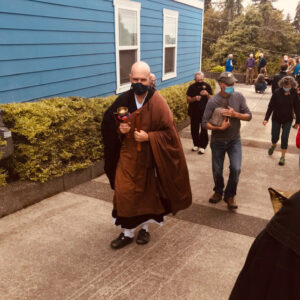
Nomon Tim Burnett in full robes leads Red Cedar Sangha members in a last walk around their former zendo.
It is evident the pandemic has compelled our practice communities to adapt in many ways. Letting go our beloved temples was not an easy decision, but it was the right decision.
Chikyo Ryunin Ewan Magie is a Soto Zen priest in the Suzuki Roshi lineage. Ordained in September 2019 by Nomon Tim Burnett at Red Cedar Zen in Bellingham, he practiced with Eko Jeff Kelley at Seattle Soto Zen the prior decade.
Magie has been particularly inspired by the teachings of Zoketsu Norman Fischer, founder of Everyday Zen. Currently Magie lives in northeastern Colorado, and practices with Jodo Cliff Clusin at Prairie Mountain Zen Center in Longmont. Magie offers meditation classes, and serves on the executive boards and practice councils of both Seattle Soto Zen and Prairie Mountain Zen Center.
